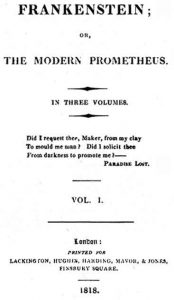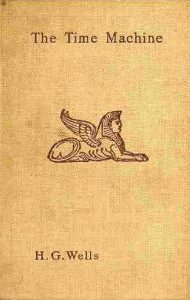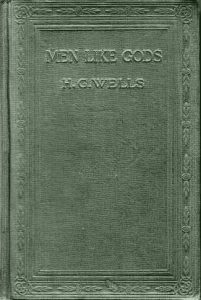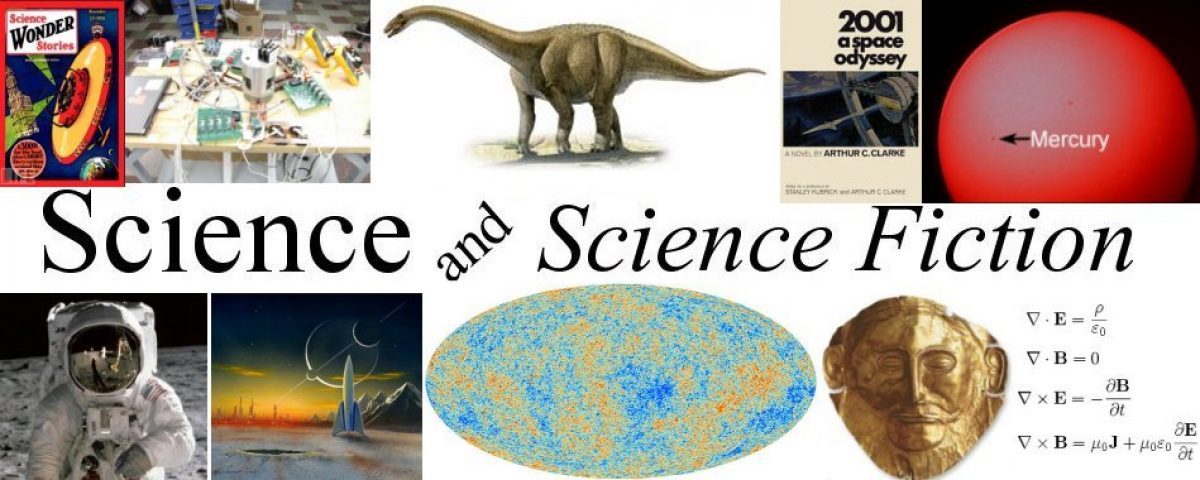This time I intend to complete our discussion of the ‘Great Themes’ of Science Fiction as well as discuss Science Fiction stories that try to avoid using any of the themes, it’s not as easy as you might think.
As a reminder last time I proposed six themes that were central to the genre of Science Fiction:
- The exploration of space and/or time
- The effects of new technology, invention on human society
- Contact with alien life, alien intelligence
- The creation of artificial life, artificial intelligence
- The long term future, purpose (if there is one) of humanity
- The nature and purpose (if there is one) of the Universe itself
In my previous post we talked a bit about the first three themes so with out further ado here’s number four.
The Creation of Artificial Life, Artificial Intelligence and the novel I’ll use as an example will be ‘Frankenstein’ by Mary Shelly which was first published in 1818. Of all the novels I’ve mentioned so far I think undoubtedly ‘Frankenstein’ is the most famous but just in case there’s someone who’s never heard of it here’s the story.

The story concerns a scientist named Victor Frankenstein who as a child read about the old alchemists and their search for the philosopher’s stone and the secret of immortality. As a student at the University of Ingolstadt he gains the knowledge of the then brand new sciences of chemistry and electricity. Using this knowledge he manufactures and brings life to an artificial man constructed from materials he obtained in “The dissecting room and the slaughter-house”.
The very instant the creature is brought to life Frankenstein is horrified by what he has accomplished and flees not only from his creation but from his responsibility to it. This is certainly the first moral of the novel, that scientists must be willing to take responsibility for their discoveries, a moral that rings even stronger today in our world of nuclear weapons, electronic surveillance, gene modification and you know I could go on and on.
The rest of the story continues the morality play with the creature, who is both intelligent and humane, being tormented for it’s ugliness and finally taking a brutal revenge on it’s maker for having abandoned it.
The plot of a scientist creating an intelligent being and then being destroyed by their creation has now become the most overdone cliché in all of Science Fiction. Whether the creature is portrayed as a robot or a trained ape (‘The Planet of the Apes’ has a strong trace of Frankenstein in it) doesn’t matter, Frankenstein’s monster is as alive today as it ever was.
Moving on to our next Great Theme ‘The Future and Purpose (if there is one) of Humanity. Finding a novel that only displayed this theme turned out to be quite difficult so in the end I decided to cheat and go with H. G. Wells’ ‘The Time Machine’ published in 1895. Now obviously The Time Machine also includes our first theme of Exploration of Space / Time but because it also demonstrates our present theme so clearly I hope you’ll forgive me.

In The Time Machine a scientist invents a means of traveling back and forth through time and uses his device to travel forward to the year 802,701 A.D. Arriving in the far future the Time Traveler, his name is never given in the story, finds that the human race has continued to evolve, indeed it had split into two species, the Eloi and the Morlocks. The Time Traveler conjectures that the split into two species happened when the rich aristocrats of his own time had forced the labouring poor to live underground (H. G. Wells was a socialist who got the idea from the building of the first London underground subway).
Without any need to struggle the Eloi have become both beautiful and graceful but at the same time they are small, weak and ineffectual. On the other hand the Morlocks are brutish troglodytes, unable to stand the bright light of the daytime. Also, because there are no large animals remaining on Earth (Because of mankind’s destruction of the environment?) the Eloi have become vegetarians while the Morlocks have turned the tables on their former masters and now eat the Eloi!
Not a pretty picture of our future perhaps but certainly one that illustrates our theme of ‘The Future and Purpose of Mankind’. Science Fiction stories that make use of the future of mankind theme do have a tendency to be either bleak or preachy, or both. Sometimes the author’s vision of the way ‘things ought to be’ can get in the way of telling the story but in my mind at least ‘The Time Machine’ avoids this problem.
We now come to our last theme ‘The Nature and Purpose (if there is one) of the Universe Itself’. If you think about it this theme really borders on religion, another way of stating it could be ‘Why did God create the Universe’ or even “Was there a recognizable “GOD” who created the Universe’. In keeping with the otherworldly aspects of this theme the novel I shall use as an example is H. G. Wells’ “Men Like Gods” first published in 1923.

Another thing to keep in mind is that in this theme, even more than our previous one, the author can easily find himself telling his readers how he things things ought to be instead of allowing them to imagine how things could be. In ‘Men like Gods’ Wells falls into this trap, making the story more sermon than Science Fiction.
In ‘Men like Gods’ the main character, a Mr. Barnstaple, is involved in a traffic accident that inexplicably transports him to a parallel world called Utopia. The fact that Wells has now resorted to magic when in his earlier stories he would have extrapolated from science is a symptom of how he’s become more interested in describing how the people living in a utopia would behave than in providing a realistic basis for that world.
And Wells’ utopia is based upon ideas originated by the French philosopher Henri Bergson and promoted by Wells’ fellow socialist G. Bernard Shaw. The basic idea of Bergson and Shaw is that the entire Universe is permeated by a ‘Force of Life’. (And if that reminds you of ‘The Force’ in Star Wars, yes that is a variation of the idea). This Life Force is what causes evolution as it experiments with living creatures with the goal of creating more complex, more intelligent life.
The Utopia in ‘Men like Gods’ is simply a world that is further along in this process, about 3000 years in the story and as Mr. Barnstaple returns to our Earth with all its troubles he resolves to dedicate the rest of his life to bringing utopia to our world.
Before I finish for today I’d like to take just a brief moment to discuss those Science Fiction stories that don’t actually make any real use of our Great Themes. You may recall a review I wrote in my post of 1Mar17 about the novel ‘Luna: New Moon’ by Ian McDonald. In that review I made the point that even though the story takes place on the Moon, and there’s Hi-Tech wizardry on every page the plot would fit just as well during the time of the emperors of Rome.
So is ‘Luna: New Moon’ a Science Fiction story? Of course each of us will have to decide for ourselves but I’m always willing to be inclusive. The important thing for me is that a Science Fiction story should make me think. I have found that most of the time it will be about one of the six themes I’ve discussed, but thinking is the important thing.
Next time I’d like to finish my discussion of Science Fiction by considering the difference between Science Fiction and Fantasy, at least as I see it. Till then.

Way cool! Some very valid points! I appreciate you
writing this post plus the rest of the website is also very good.
Thanks for the comment and I’ll try to keep up the quality if you promise to come back!
Bob L
Hi, I do believe this is a great site. I stumbledupon it 😉 I am going to
revisit once again since I book marked it. Money and freedom is the best way
to change, may you be rich and continue to help other people.
Thanks for the comment and I hope you will come back real soon.
Bob L
I was able to find good advice from your content.
Thanks for the comment and come back soon!
Bob L